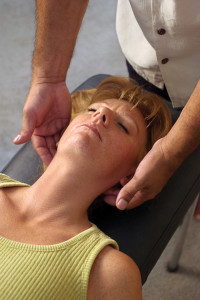Neck pain can be acute or chronic, but regardless, when you’re in pain, relief is the first thing on your mind. Just as important as relief, of course, is finding the cause and ensuring you avoid the behavior / action that brought the pain on in the first place. You need the proven help of Chiropractic.
A 40 year old gentleman came in last week after changing a set of taps in his bathroom. He felt okay that night, but woke up the next morning with severe neck pain. The awkward position he got in under the sink caused an unusual strain on his neck and shoulder muscles and joints. It caused a slight damage at the time, but not enough to notice until after a night’s sleep. The swelling around the joints and the spasm in the muscles increased to the point where he was very sore in the morning. Luckily he gave us a call and felt much better right away.
Here are five common causes of neck pain – and why doctors of chiropractic are well-suited to relieve the pain and determine the underlying cause.
1. Poor Posture: Leaning over a desk all day or slouching in your office chair? You’re bound to develop neck pain eventually, if you haven’t already. Do this quick test: In an upright or seated position, round your shoulders and back (poor posture as in picture above). See how far you can turn your neck. Does it impact your neck as well? Exactly!
2. Screen Time: Staring at the computer screen for hours at a time? That’s not good for your health (or sanity), but from a neck pain perspective, it’s madness, particularly if the screen forces you to crane your neck up (too high) or extend it down (too low).
3. Sleep Issues: Ideally, we spend a third of our day sleeping, so your sleep habits – for better or worse – can have a dramatic effect on your health. With regard to neck pain, anytime you sleep in an uncomfortable position, particularly one that stresses your neck musculature (think about side-sleeping while grabbing your pillow tightly, sleeping on your stomach with your arms out in front of you, or even sleeping on your back, but with a pillow that doesn’t adequately support your neck), you risk neck pain.
4. Technology Overload: We may spend a third of our day sleeping, but we increasingly spend the other 16 hours typing, texting, tapping and otherwise interacting with our smartphones, tablets, etc. Bottom line: bad for your neck. Many have actually coined the phrase, “text neck” to describe the neck pain that can result from this constant technology interaction.
5. The Wrong Movement: Twisting, turning, stretching and stressing your neck is an easy way to cause neck pain. While the muscles in the neck are strong, they can be strained, sprained and even torn, just like any other muscle.
It’s important to note that beyond these common causes, various other health issues can also contribute to or directly cause neck pain, including fibromyalgia, cervical arthritis or spondylosis (essentially spinal arthritis), spinal stenosis (narrowing of the spinal canal), infection of the spine, and even cancer. The good news is that a doctor of chiropractic can help identify which of these or the above causes is to blame.
When neck pain strikes, most people turn to a temporary solution first: pain-relieving medication. But that’s not a permanent solution, of course, and it doesn’t address the cause of the pain at all, which could be something relatively minor – or more serious. What’s more, research suggests chiropractic spinal manipulation is actually more effective than over-the-counter and prescription medication for relieving both acute and subacute neck pain. Also, more recent research points to the fact that even over-the-counter pain relievers increase your risk of developing serious health conditions such as heart disease and stomach disorders.
Suffering from neck pain? Then give your Doctor of Chiropractic a call. They’ll help you relieve your pain and determine the cause so it doesn’t return. You may need a few adjustments or manipulations at first, but you will also be given specific exercises to help stop the pain and help prevent a recurrence.




